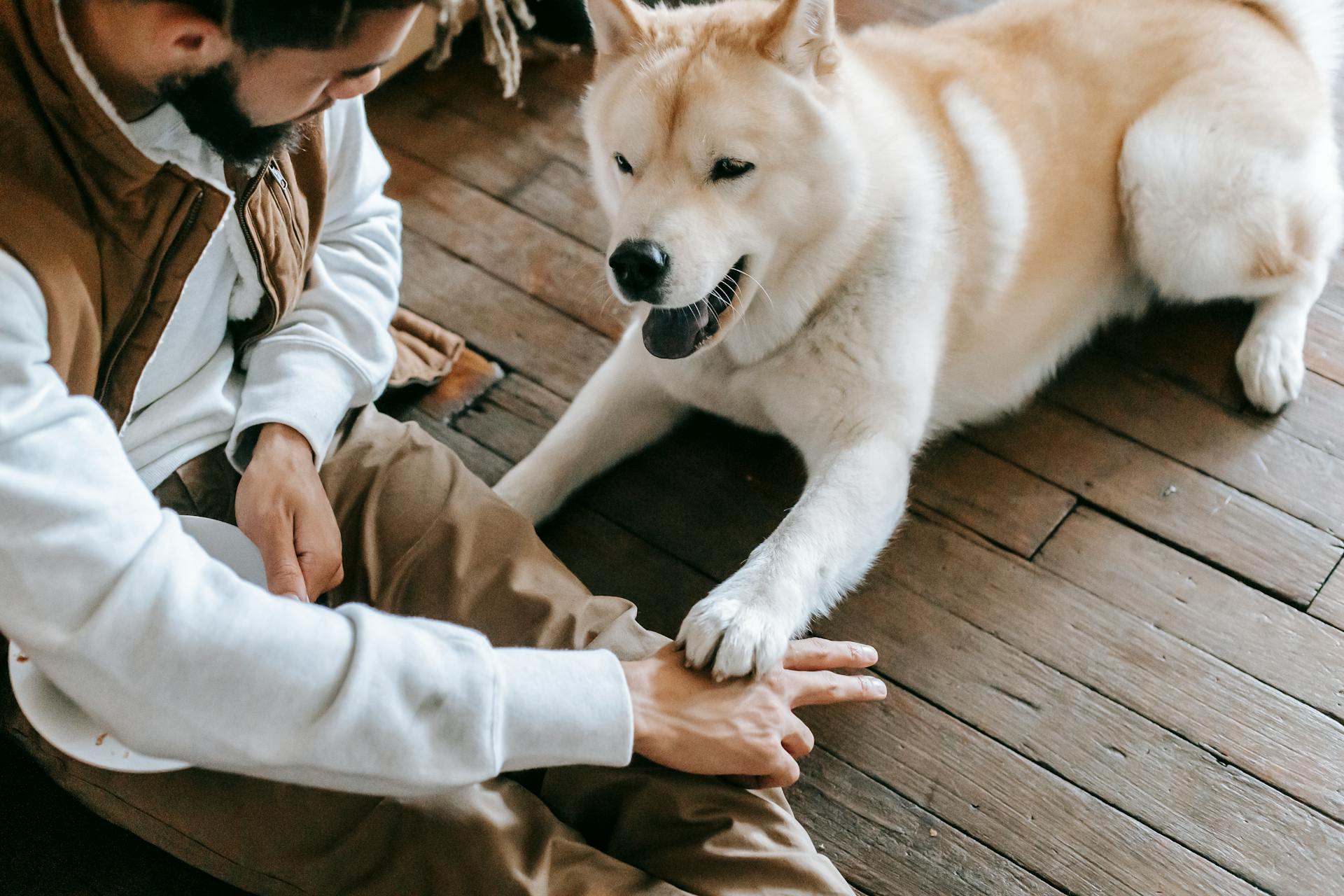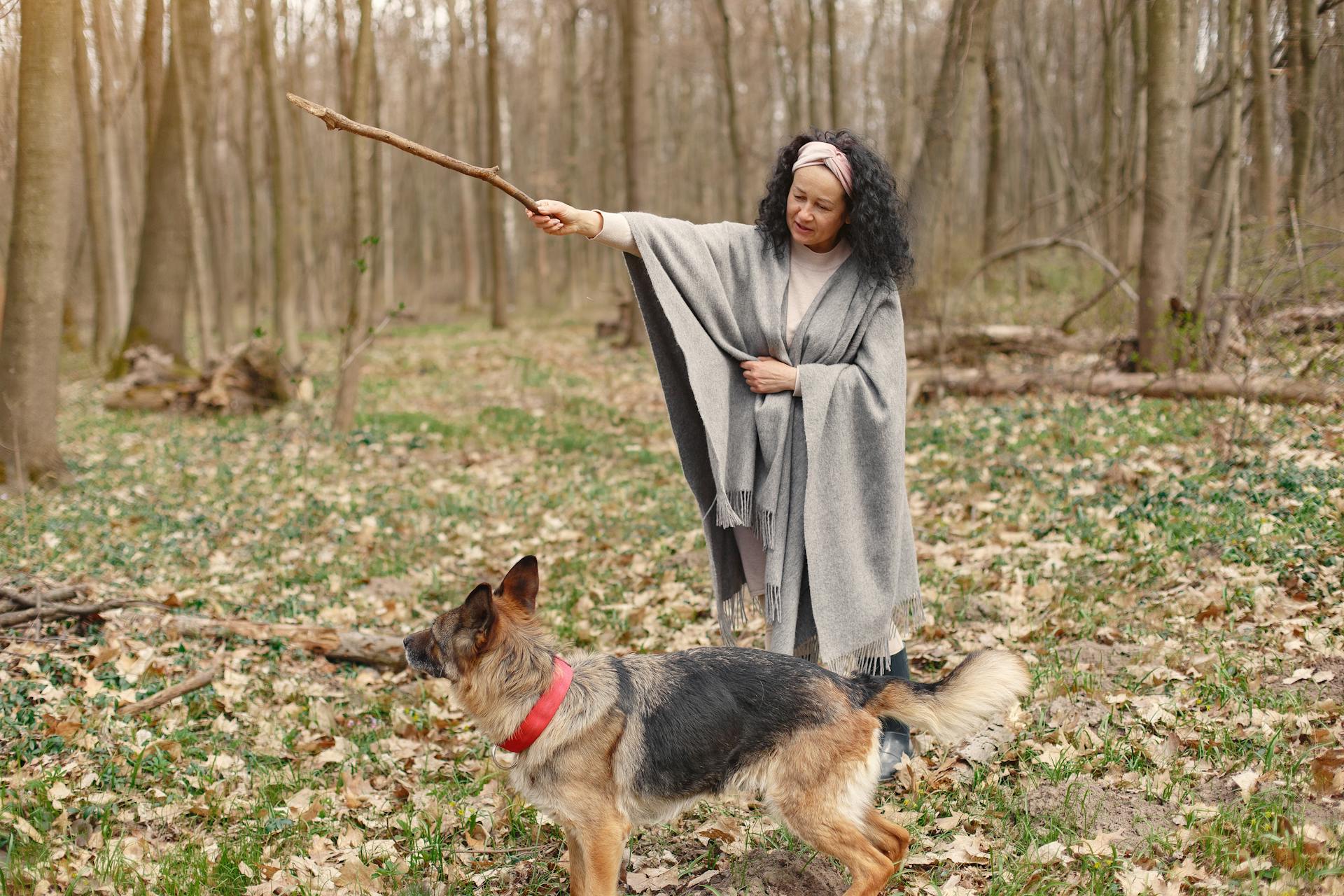
Training your dog to use a doorbell can be a game-changer for both you and your furry friend.
By teaching your dog to ring a doorbell to request entry, you'll save yourself the hassle of constantly getting up to let them in, and they'll learn to communicate their needs more effectively.
Start by introducing the doorbell to your dog in a controlled environment, such as a quiet room or hallway.
Recommended read: Training Dog Not to Bark at Doorbell
Preparation
To start bell training, you'll need to purchase a bell. The louder the better, think cowbell or sleigh bell rather than a dainty little wind chime.
You can hang the bell from the door that leads to your dog's outdoor restroom using a ribbon. The bell should fall at or just below the level of your dog's nose.
Here are the three types of bells you can use for bell training:
- The bell that hangs on a ribbon
- A palm bell that sets on the floor (Tellbell)
- Bells that stick to the door and when pressed act like a wireless doorbell (Mighty Paw Smart Bell)
Things to Know Before Potty Training
Potty training a dog requires patience and understanding. It can take four to six months, and sometimes up to a year, for a dog to fully learn where to go potty.

Designating a specific potty area is a helpful step in the process. This will make it easier for your dog to learn what's expected of them.
Smaller dogs can be more challenging to train because they may feel lost in a larger space and have accidents. Adult dogs may also take longer to train if they've developed bad habits from a previous owner.
Here are some common times when your dog is likely to need to go potty:
- Within moments of waking up and moving around
- After a nice play spell
- After eating time
- When visiting a new location (due to curiosity, marking territory, and/or nervousness)
Positive reinforcement is key when potty training your dog. Using punishment is never a good idea and can actually hinder the training process.
What to Do?
To start bell training, you'll need to purchase a bell, preferably a loud one like a cowbell or sleigh bell. The louder the bell, the better it will work.
Hang the bell from the door that leads to your dog's outdoor restroom, using a ribbon to secure it. The bell should fall at or just below the level of your dog's nose.
For more insights, see: Dog Training Bell

Gently swing the bell so that it taps your dog's muzzle when it's time to go outside. Immediately praise your dog and open the door.
Repeat this process every time your dog goes outside for seven days. This will help your dog associate the sound of the bell with going outside.
On the eighth day, gently move the bell so that it stops swaying just in front of your dog's nose. If your dog extends her muzzle to touch the bell, you're ready to proceed.
You can also use a palm bell that sets on the floor, such as a Tellbell, or a bell that sticks to the door and acts like a wireless doorbell, like the Mighty Paw Smart Bell.
Here's a simple step-by-step guide to help you get started:
- Purchase a loud bell
- Hang the bell from the door
- Swing the bell to tap your dog's muzzle
- Praise your dog and open the door
- Repeat for seven days
- Move the bell to the correct position on the eighth day
By following these steps, you can teach your dog to ring the bell to let you know when they need to go outside.
Training Methods
Training your dog to ring a bell is a great way to communicate their needs, and it's surprisingly easy to do. You can start by introducing the bell or button to your dog and letting them explore it, then rewarding them for interest or engagement.
Using bells hanging from the doorknob or near the door is a simple and inexpensive option. You can also use recordable buttons, like the ones popularized by Christina Hunger, for a more high-tech approach. These buttons use a method that's been shown to be effective in teaching dogs to communicate.
To teach your dog to ring the bell, start by placing it near the door you use most frequently to take your dog out. Each time you take your dog out, press the button or ring the bell, so they can make the association between the bell ringing and going outside.
Consistency is key when building this skill, so make sure to use the bell or button every time you take your dog out. You can also try teaching your dog to ring the bell in different locations, such as a few feet from the door, to help them understand the association.
Related reading: How to Start a Dog Training Business
Here are the steps to teach your dog to ring the bell:
- Hold the bell near your dog's nose and reward them for touching it.
- Gradually increase the volume of the bell ringing and reward your dog for ringing it at the desired volume.
- Place the bell on the door and repeat the process until your dog can ring the bell at the desired volume while it's on the door.
- Associate the bell ringing with going outside by bringing your dog to the door and rewarding them with treats when they ring the bell.
By following these steps and being consistent, you can teach your dog to ring the bell and communicate their needs to you.
Association and Relationship
Having a shared language of bells or buttons between you and your dog can help decrease frustration in the home and increase your bond with them.
Adult dogs can typically go a few hours at a time, so it's essential to accommodate their abilities and patterns to minimize frustration and false expectations.
Using a bell system can help your dog communicate their needs with other people in your home who might be less attuned to their natural signals that they need to potty.
Ringing the bell should be associated with being taken outside, not just to go outside, to help your dog understand the connection between the two.
For another approach, see: How to Get a Female Dog to Pee outside
Frequently Asked Questions
Do doggie doorbells work?
Yes, doggie doorbells can be an effective way to communicate with your dog, helping them clearly express their needs. They can be especially helpful during potty training and for dogs of all ages.
What age to bell train a puppy?
Typically, puppies are ready for bell training between 8-12 weeks of age. Training at this age helps establish good habits and lays the foundation for successful potty training
How to stop a dog barking when the doorbell rings?
Associate the doorbell with treats by ringing it and immediately rewarding your dog with a snack when they remain quiet. Repeat this process to help your dog learn to calmly respond to doorbell noise
Sources
- https://www.socalk9training.com/doggie-doorbell-training/
- https://www.akc.org/expert-advice/training/teach-dog-ring-bell-go-outside/
- https://walkandwagchapelhill.com/how-to-train-your-dog-to-use-a-potty-bell-in-just-two-weeks/
- https://petharmonytraining.com/whats-going-wrong-with-your-bell-training/
- https://alternativecaninetraining.com/2021/05/28/bell-training-how-to-potty-train-dogs-using-a-bell/
Featured Images: pexels.com


